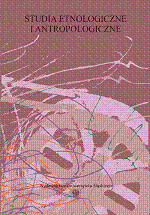Aktywność zorganizowana, czyli o przejawach działalności emerytów i rencistów w środowisku miejskim
Organised activeness or on the evidence of the activity of the retired and pensioners in the urban environment
Author(s): Dorota Świtała-TrybekSubject(s): Anthropology
Published by: Wydawnictwo Uniwersytetu Śląskiego
Summary/Abstract: The subject of analysis constitutes organised activeness, reflecting itself in intentional forms of the activity related to a given group of people (the retired and pensioners) and selected centres where the very activeness is visible. In the local communities of the Silesian Voivodship (on the basis of the field studies conducted between 2003 and 2007) four characteristic types of organised activeness were distinguished. The first one is composed of the university of the third age. The second comprises circles (clubs) associating former workers of e.g. mines, steelworks, power stations functioning nearby the factories in question. The third group constitutes senior groups functioning nearby different institutions, e.g. a community centre, social welfare house, parishes. The fourth one (referred to as the “union” one) is connected with people’s affiliation to different unions and organizations involving hobbysts, e.g. stamp collectors, pigeon breeders, bee keepers, skaters, beer label collectors, etc. Differentiated reflections of organised activeness among the retired and pensioners show how it is possible to still effectively function in the society, perform certain roles in spite of having gone into the professional retirement. The need of affiliation, formerly satisfied by workmates is now satisfied by different groups related with different people and institutions (community centres, assosiations, clubs, unions, etc). It is thanks to these two factors that the elederly people have a chance to find themelves among other seniors having similar interests, develop their passions, complete gaps in their education, jointly realize tasks, struggle with life difficulties, experience success and failure. In other words, flee from idleness, thus finding the confirmation of their self value and life aim. One can estimate that organised activeness among the retired and pensioners is most efficiently realised in the local environment. Undoubtedly, it is the urban space that facilitates different forms of activeness thanks to the cultural educational institutions, unions, and clubs nearby the work places functioning in it. In this space, consisting in many social groups, life styles, man can choose from and decide him/herself on a given form of his/her own activeness.
Journal: Studia Etnologiczne i Antropologiczne
- Issue Year: 2010
- Issue No: 10
- Page Range: 268-284
- Page Count: 17
- Language: Polish

